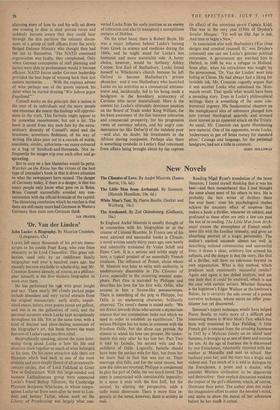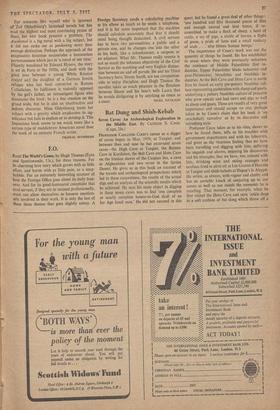New Novels
IN England Andrd Maurois is usually thought of in connection with his biographies or as the creator of Colonel Bramble. In France one of his most admired and successful books is Climats, a novel written nearly thirty years ago, now newly and admirably translated by Violet Schiff and Esme Cook. It is a serious and subtle study of love, a typical product of an essentially French tradition. The influence of Proust, about whom M. Maurois was later to write with authority, is unobtrusively discernible in The Climates of Love, especially in the recurring musical meta- phors. Part One is narrated by Philippe and describes his love for his first wife, Odile, who arouses in him a Swann-like• possessiveness. There is something of the prig in Philippe, but Odile is an enchanting character, brilliantly observed. The novel's theme is stated early : 'We are drawn towards those who secrete a mysterious essence that our composition lacks and which we need in order to establish an equilibrium.' The serious Philippe has no tastes in common with the frivolous Odile, but she alone can provide the climate in which his love can prosper. He under- stands this only after he has lost her. Part Two is told by Isabelle, his second wife and the antithesis of Odile. Logically, Isabelle should have been the perfect wife for him, but from her we learn that in fact this was not so. Their marriage also fails, and for the same reason, but now the roles are reversed; Philippe is condemned to play the part of Odile, the too much loved. The story is constructed with considerable ingenuity; in a sense it ends with the first half, but the second, by altering the perspective, adds a sadly ironic dimension. There is more than in- genuity in the novel, however; there is artistry as well. Reading Nigel Ryan's translation of the latest Simenon, I found myself thinking that it was his best—and then remembered that I had thought the same about most of his others in turn. He is probably the best writer of thrillers there has ever been : even his psychological studies achieve the uncanny effect of suspense that makes a book a thriller, whatever its subject, and profound as these often are only a few can pass the test of re-reading. The Little Man from Arch- angel creates the atmosphere of French small- town life with the familiar intensity, and gives an absorbing portrait of a tragic personality. The author's method succeeds almost too well in describing isolated communities and uneventful lives; it draws a clear, arbitrary line around his subjects, and the danger is that the story, like that of a thriller, will have no relevance beyond its own organisation. What is this method, which produces such consistently successful results? Again and again it has defied analysis,' and yet one feels that it could be analysed, which is not the case with certain writers. Whether Simenon is the highbrow's Edgar Wallace or the lowbrow's Balzac, he is certainly the sole owner of a patent narrative technique, whose secret no other prac-
titioner has yet discovered. •
Simenon's expert technique would have helped Pierre Boulle to make more of a difficult and interesting theme in White Man's Test, which has been well translated by Xan Fielding. A little French girl is rescued from the invading Japanese in 1942 by a Malayan family on an island near Sumatra, is brought up as one of them and marries the son. At the age of fourteen she is discovered by two Frenchmen, reluctantly reunited with her mother at Marseille and sent to school. Her husband joins her, and the story has a tragic and violent end. Too much of it is told in dialogue by the Frenchmen, a priest and a doctor, who consider Western civilisation to be degenerate and destructive : their explicit discussion weakens the impact of the girl's dilemma, which, of course, illustrates their point. The author does not make the imaginative effort to enter the heroine's mind, and starts to draw the moral of her adventure before he has made it actual. For someone like myself who is ignorant of Zoe Oldenbourg's historical novels but has read the highest and most convincing praise of them, her new book presents a problem. The Awakened is a big novel with a big subject, but it did not strike me as possessing more than average distinction. Perhaps the approach of the imaginative historian necessitates a humourless portentousness which jars in 'a novel of our time.' Fluently translated by Edward Hyams, the story is set in Paris in the 1930s, and deals with the great love between a young White Russian émigré and the daughter of a German Jewish refugee who has been converted to Roman Catholicism. Its fulfilment is violently opposed by the girl's father, an intransigent figure who dominates the book; he is a fine creation on the grand scale, but he is also an unattractive and tedious character. Mme Oldenbourg treats her subject with a gravity which emphasises its sig- nificance but fails to explain or to develop it. This loquacious book seems to me much more like a certain type of middlebrow American novel than the work of an eminent French writer.
FRANCIS WYNDHAM















































 Previous page
Previous page